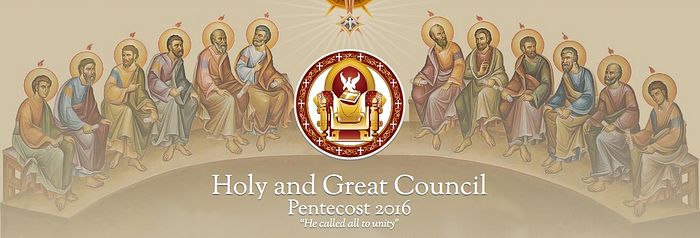
COUNCIL MESSAGE COULD CODIFY FOUR NEW ECUMENICAL COUNCILS

www.pravoslavie.ru – 20/6/16
In addition to discussing the six documents prepared beforehand at previous conferences, participants at the ongoing council, begun yesterday on the Great Feast of Pentecost on the island of Crete, are also to deliberate over and publish the official “Message” of the council.
A draft of the document covers an array of topics including the questions of remarriage and marriage to non-Orthodox, the oneness and unity of the Church in the holy Eucharist, the importance of the Patristic Tradition, and the Church’s vision of conciliarity which places no one bishop over all others, among other matters, according to a source familiar with the document.
While the document mainly “states the obvious” on such topics in terms that all the Local Churches can agree on, the draft document, in large part prepared by theologians of the Greek and Serbian Churches, does contain some more noteworthy passages.
In it, the current gathering is referred to as a preparatory council for a further series of councils, rather than a one-time event, noting that the absence of four Local Churches is properly speaking the failure of all involved, and that the issues preventing certain Churches from participating in the current council are to be resolved before the convening of the next, that all might attend in good conscience.
Notably, the draft document currently under consideration also recognizes as ecumenical the Photian Council of 879-880, already sometimes referred to as the Eighth Ecumenical Council, which condemned the Latin addition of the Filioque into the Nicene Creed; the hesychast councils of Constantinople held between 1341 and 1351, already sometimes collectively referred to as the Ninth Ecumenical Council, which upheld the distinction between the essence and energies of God and man’s ability to commune with these energies; the 1642 Council of Iași (Jassy) which countered certain Catholic and Protestant heresies which had exercised some degree of influence on Orthodox theology; and the 1672 Council of Jerusalem which refuted Calvinism and also rejected the Filioque.
Regarding these councils, the document especially notes their statements against Western scholasticism and the imbalanced emphasis on reason as obstacles to unity, and in light of the Councils of Iași and Jerusalem, states that the Catholic and Protestant confessions in no way make up a part of the Church, while avoiding the use of the word “heretic.”
The overall atmosphere at the current council is that most have a favorable impression of the document, according to the source. However, it is as yet a draft document and it remains to be seen what precise message the participating bishops and Churches will release.
